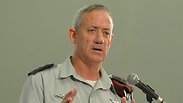
'Gantz is not fighting for equality as IDF fighters and their parents expect him to'
Photo: Yossi Zeliger
This week, Lieutenant-General Benny Gantz
will begin his fourth and last year as chief of staff. This is a good time to ask what heritage he will be leaving behind. Indeed, the borders are quiet and he will be given credit for rehabilitating the army after the Harpaz affair,
but there is one more front which remains breached.
Unlike his predecessors, Gantz, who is known for his calm demeanor, prefers not to confront the political echelon. And yet, even if this is a controversial issue, the chief of staff must not bury his head in the sand and keep silent. The public expects the army not to be indifferent to the equal share of the burden and the supreme commander to speak his piece.
The social and dramatic issue of an equal share of the burden, which was dropped on the General Staff's doorstep, could have allowed Gantz to leave a real mark, but for some reason his voice has not been heard on the issue, and it doesn’t seem as if the army commanders are fighting for equality as the fighters and their parents are expecting them to do. Gantz did express the army's stance in front of the Shaked Committee, but he did not insist on it firmly enough and did not ensure that the public would also know what he thinks.
Draft Bill
Yossi Yehoshua
Analysis: IDF has surplus of soldiers, shortage of quality manpower, new draft bill will only make matters worse
It is Gantz's duty to voice his opinion in public, as such a statement could serve as a significant impact of pressure on the decision makers. A chief of staff who voices his opinion about the defense budget must voice his opinion on the equal share issue as well. The army should have expressed its opinion on the issue clearly and undauntedly: I want to choose the recruits because I don't need everyone, I need fighters and soldiers with technological knowledge, and I don't need to receive them at the age of 24. And of course the important ethical statement that whoever will not enlist will do national or civil service.
The IDF has to appear to be doing everything to increase the equal share of the burden. Unfortunately, that is not the way things are. And it's not the first time: Last time the IDF failed to get the Knesset to fight against female draft dodgers. Figures show that 43% of girls don't enlist and 36% are discharged through declarations, many of which are fictitious. The army has failed to convince the Knesset members to seal the breach and the numbers are expected to go up. Those who will pay the price are the girls who do enlist, whose service is expected to be extended by four months.
The IDF is experiencing a powerful blow in terms of its regular service, career service and reserve service personnel: A drop in motivation, a drop in the number of recruits and a drop in the quality of career soldiers. Its rotten fruit may be eaten by all of us in the next war, if it breaks out. The Shaked Committee should have been a huge opportunity for the army to fix the situation, if only a little. The way it looks now, it will only make it worse.















